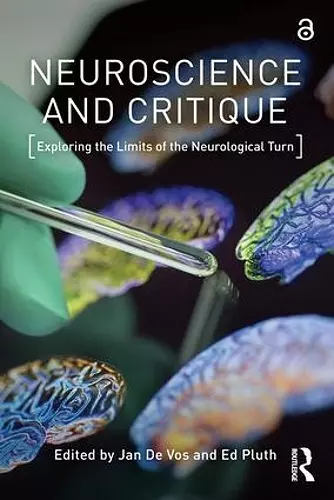Neuroscience and Critique
Exploring the Limits of the Neurological Turn
Jan De Vos editor Ed Pluth editor
Format:Paperback
Publisher:Taylor & Francis Ltd
Published:19th Nov '15
Currently unavailable, and unfortunately no date known when it will be back
This paperback is available in another edition too:
- Hardback£155.00(9781138887336)

Recent years have seen a rapid growth in neuroscientific research, and an expansion beyond basic research to incorporate elements of the arts, humanities and social sciences. It has been suggested that the neurosciences will bring about major transformations in the understanding of ourselves, our culture and our society. In academia one finds debates within psychology, philosophy and literature about the implications of developments within the neurosciences, and the emerging fields of educational neuroscience, neuro-economics, and neuro-aesthetics also bear witness to a ‘neurological turn’ which is currently taking place.
Neuroscience and Critique
is a ground-breaking edited collection which reflects on the impact of neuroscience in contemporary social science and the humanities. It is the first book to consider possibilities for a critique of the theories, practices, and implications of contemporary neuroscience.
Chapter 7 of this book is freely available as a downloadable Open Access PDF at http://www.taylorfrancis.com under a Creative Commons Attribution-Non Commercial-No Derivatives (CC-BY-NC-ND) 3.0 license.
'De Vos and Pluth deliver what is really needed today: a critique of neuroscientific reason in the strict Kantian sense. They avoid the twin trap of either succumbing to the fascination with brain sciences or their desperate humanist rejection. Instead, they ask the truly relevant questions about the exact status of neurosciences, as well as about their epistemological, ethical and political implications. It’s a book for those who still dare to think!' – Slavoj Žižek, University of Ljubljana, Slovenia
'The contributors to Neuroscience and Critique bring cutting-edge theoretical concepts and debates to bear on the claim that research in neurology can finally explain the formation and operation of our subjectivity. The ‘limits’ of the neuro-turn turn out to be intrinsic to our nature as human subjects, a nature that neuroscience caricatures as it attempts to capture it. This book intensifies the terms of critique so that we are able to see how we might escape neuro-reductionism while embracing the indeterminate and ethical choices that real ‘critique’ requires'. – Ian Parker, Psychoanalyst in Manchester and Professor of Management, University of Leicester, UK
'[Those] interested... will find Neuroscience and Critique likely to be one of the most stimulating and thought-provoking books they will have read in recent years... [If] your idea of "beach reading" is thoughtful, substantive, scholarly writing that takes you outside your usual reading ruts so that you return to your endeavors enriched--well, have I got a critique for you.' -Richard Ruth, George Washington University, PsycCritiques
De Vos and Pluth deliver what is really needed today: a critique of neuroscientific reason in the strict Kantian sense. They avoid the twin trap of either succumbing to the fascination with brain sciences or their desperate humanist rejection. Instead, they ask the truly relevant questions about the exact status of neurosciences, as well as about their epistemological, ethical and political implications. It’s a book for those who still dare to think! - Slavoj Žižek, University of Ljubljana, Slovenia
The contributors to Neuroscience and Critique bring cutting-edge theoretical concepts and debates to bear on the claim that research in neurology can finally explain the formation and operation of our subjectivity. The ‘limits’ of the neuro-turn turn out to be intrinsic to our nature as human subjects, a nature that neuroscience caricatures as it attempts to capture it. This book intensifies the terms of critique so that we are able to see how we might escape neuro-reductionism while embracing the indeterminate and ethical choices that real ‘critique’ requires. - Ian Parker, Psychoanalyst in Manchester and Professor of Management, University of Leicester, UK
ISBN: 9781138887350
Dimensions: unknown
Weight: 380g
236 pages